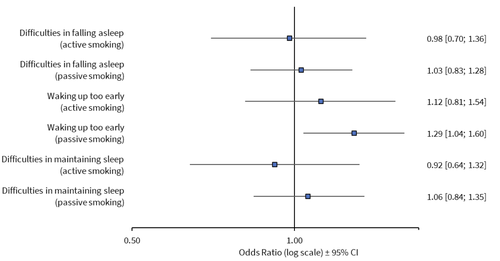
CHAPUT Jean-Philippe
- Department of Pediatrics, University of Ottawa, Ottawa, Canada
- Health & Disease, Physical Activity
Recommendations: 0
Review: 1
Review: 1

Cigarette smoke exposure as a potential risk factor for sleep problems in pregnant women
Have you ever wondered about the relationship between active/passive smoking and sleep in pregnant women?
Recommended by Géraldine Escriva-Boulley based on reviews by Silvio Maltagliati, Florian Chouchou and Jean-Philippe ChaputPregnancy has been shown to affect the quality, duration, and pattern of sleep (Paavonen et al., 2017; Reid et al., 2017). These changes have important implications, as insufficient sleep is associated with health problems and complications during labor. In line with studies investigating the general population, a few studies focused on pregnant smokers and have also shown a prevalence of sleep abnormalities (e.g., Danilov et al., 2022; Lange et al., 2018; Paavonen et al., 2017). Studies examining the role of passive smoking on sleep are rare, be it in the general population or in pregnant women.
The aim of the Ciochon et al. study was to investigate the relationship between active or passive smoking and three types of sleep problems during pregnancy: difficulty falling asleep, difficulty staying asleep, and waking up too early. The authors hypothesized that pregnant women's exposure to smoking (active and passive) would increase their risk of sleep problems during pregnancy.
Participants were part of a larger study: the Corona Mums project, which included 3365 pregnant women from Poland, aged 18 to 43 years. These women completed an online questionnaire during the COVID-19 pandemic, from May 2020 to September 2021. The authors conducted multivariate logistic regressions that included the following control variables: socio-demographic, pregnancy-related variables, and psychological variables.
The results of the study showed that passive smoking is a risk factor for waking up too early, but they showed no evidence suggesting that active or passive smoking was related to any of the other sleep variables. The authors highlighted the roles of control variables included in the models. Specifically, sleep difficulties were related to age, place of residence, education, level of anxiety and depression in pregnant women, and the presence of nausea or vomiting. Further, in all the models, the level of anxiety, depression, and trimester of pregnancy (3rd trimester in comparison to 1st and 2nd) were significantly related to the risk of occurrence of sleep problems.
While only one of the six examined associations showed statistical significance, the findings are still useful in highlighting potential risks associated with passive smoking and sleep disturbances during pregnancy. The study also underscores the need for more comprehensive investigations, including direct measures of sleep quality, such as actigraphy or polysomnography, which are necessary to better understand the underlying mechanisms and to confirm the potential impacts of both active and passive smoking on sleep during pregnancy.